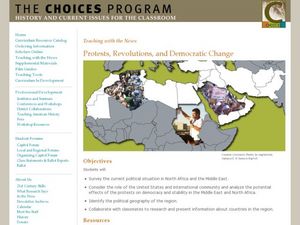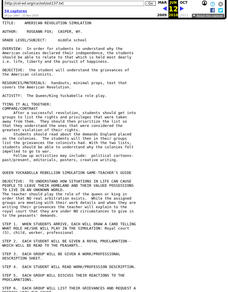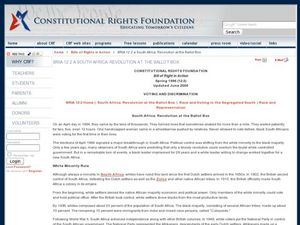Curated OER
Restructuring the Post War World: 1945-Present
You have just entered the Cold War Zone, with 96 slides at your disposal. From changes in government in China, The Marshall Plan, and the Iron Curtain, to the Vietnam War and Ronald Regan, this presentation will help you cover it all. A...
Curated OER
The Iranian Revolution
Discuss aspects of the Iranian Revolution and the Middle East Conflict. Six slides display an outline of the conflict between Shah Mohammad Reza Pahlavi and Ayatollah Khomeini, political images, and pose a question regarding the conflict.
National Endowment for the Humanities
Revolution '67, Lesson 1: Protest: Why and How
To some people, protesting is as American as apple pie, but the factors that lead to protests can be as confusing to veteran activists as to today's youth. Revolution '67 explores the riots in Newark, New Jersey as a case study. Using...
National Endowment for the Humanities
Revolution '67, Lesson 2: What Happened in July 1967? How Do We Know?
Even in a world in which dozens of participants and curious onlookers record every controversial event, the basic facts of what happened are often in dispute. Revolution '67, Lesson 2 explores 1967 Newark, New Jersey using an examination...
Core Knowledge Foundation
Isn’t It Exciting? (The American Industrial Revolution and Urbanization)
America was built on the ingenuity, work ethic, and foresight of our ancestors. Sixth graders learn about the complex Gilded Age in American history, including the prominent inventors and captains of industry, and how they all connect...
Curated OER
George Washington Crossing the Delaware: A Study of Setting and Character
Students examine "Washington Crossing the Delaware." For this American Revolution lesson, students analyze the painting, research its background, and then perform skits based on their findings.
Curated OER
Lessons in Looking: Imperialism Cartoons
Using a Smartboard, learners break apart symbolism found in a political cartoon published in 1902. They work to analyze the cartoon in terms of US Imperialism occurring in the late 1890s. All necessary materials are included in this well...
Curated OER
Writing Exercise: The Age of Reaction
Explore the French Revolution of 1830, The Age of Reaction. The class answers five short essay questions where they define political philosophies, summarize the Revolution of 1830, and discuss the effects of the Metternich system and...
Curated OER
Ragtime: 1880-1920
Build an understanding of the social, economic, and cultural changes that were incited by the American Industrial Revolution. Learners will research the historical context of the Ragtime Era, and compose an oral presentation in the voice...
Curated OER
Cartoons and Protest
Students examine political cartoons from 1774 through today, determine their meanings through analysis and discussion, and create their own political cartoons focusing on historical issues studied in class.
Curated OER
Lesson: Emory Douglas: Revolution in Our Time, Part 2
I love lessons like this because they let kids see the power of art, poetry, and activism in times of social injustice and unrest. They'll analyze the art used by Emory Douglas in the production of the Black Panther newspaper and...
Curated OER
Protests, Revolutions, and Democratic Change
Students examine uprisings in the Middle East and North Africa. In this global issues lesson, students view video clips, conduct group research, and present their findings in group presentations about the unrest in Algeria, Bahrain,...
Curated OER
American Revolution Simulation: Colonial History, Drama
Learners explain why the American colonies declared the independence, students should relate to that which is held most dearly i.e. life, liberty and the pursuit of happiness. They participate in a drama that illustrates this.
Curriculum Development Institute
Political and Social Development in the Early Period of the Republic of China
The 1911 Revolution marked the end of China's imperial dynasties. Individuals consider the issues at stake using cartoons, graphic organizers, and discussion exercises. They then consider what came next in China's history and whether the...
Curated OER
The French Revolution
French Revolution lessons can help students explore the political, social, and economic issues of the time.
Curated OER
The Chinese economic and political model.
Ninth graders study the unique and economic and political model of modern day People's Republic of China. They make an effort to determine if the unique brand of socialism with a market-type economy as currently practiced is ...
Elizabeth Murray Project
Colonial Women During the Revolution
Young researchers use the Internet or books to find out about colonial women during the American Revolution. They organize information in a graphic to demonstrate their understanding of the research they gathered before writing a...
Curated OER
The First American Party System: Events, Issues, and Positions
Students identify factors which lead to the development of the Federalists and Democratic-Republicans. They examine the writings of Thomas Jefferson and Alexander Hamilton as well. They discuss what elements are needed for an orgainized...
Curated OER
The Emerging Political Spectrum
In this political perspectives worksheet, students complete a graphic organizer that requires them to put the listed terms, that describe Republicans, Liberals, and Conservatives from 1815-1848, in the appropriate places.
Curated OER
American Revolution: Attempting to Resolve Disputes by Communication
Students study conflicts over taxation. In this American Revolution lesson, students research the taxes imposed on the colonists by the British and determine how the colonists attempted to abolish the taxes through non-violent protests....
Curated OER
Revolution in China And the Fall of Imperialism
Students study modern Chinese history according to the fall of the Qing Dynasty through the Communist Revolution. They explain the global impact of imperialism including political and social reform in China and complete a vocabulary...
Curated OER
South Africa: Revolution at the Ballot Box
Students explore apartheid. In this South Africa lesson, students discover details regarding apartheid and determine how the black majority suffered under apartheid. Students discuss why the white minority leadership of South Africa gave...
Jamestown-Yorktown Foundation
Why Did Some Colonial Virginians Continue to Support the King?
Not all colonials supported the American Revolution. A resource from the American Revolution Museum at Yorktown ask young historians to investigate the reasons why some colonial Virginians were loyalist and continued to support King...
National Park Service
Making Choices
What factors go into a decision to enter a war? Use a collection of primary source documents and images to prompt a discussion about the American Revolution and the reasons for entering a war against Britain.

























